COVID-19: WA locations and a start date for vaccines revealed
WA has a start date for its vaccine rollout, as the federal government is aiming to vaccinate four million Australians by mid-April.
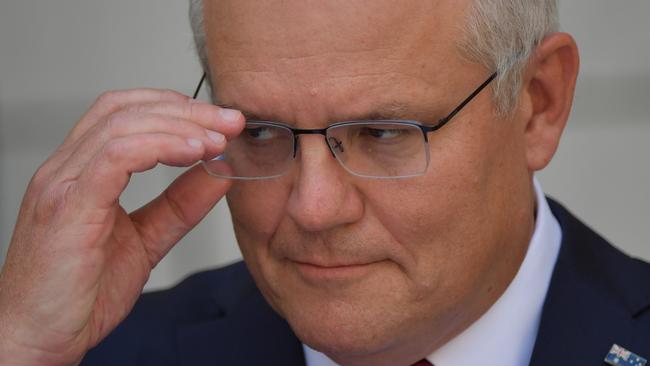
Coronavirus
Don't miss out on the headlines from Coronavirus. Followed categories will be added to My News.
Western Australia has revealed its locations and a start date for its vaccine rollout, as the federal government is aiming to vaccinate four million Australians by mid-April.
Premier Mark McGowan said about 10,000 doses of the Pfizer vaccine are set to arrive on February 22, with quarantine and border workers first in line for the jab.
Vaccines will be administered at six locations across the state including Perth Children’s Hospital, Alberta Health Campus, Hedland Health Campus and Kalgoorlie Health Campus.
“Each person requires two doses, three weeks apart,” Health Minister Roger Cook said.
Western Australia has come out of lockdown with the vaccine news.
“From all accounts so far, the transition overnight was relatively straightforward and shows people have been listening to instructions and follow the basic health advice,” he said.
On the rollout of vaccines, Mr Cook said frontline workers will be prioritised.
“It is anticipated that medical teams from the PCH vaccination hub will vaccinate high risk staff at quarantine hotels and international, the international airport with the first available vaccines,” he said.
“This is to tackle the greatest potential threat head-on.
“We will be protecting our front-line workers from international arrivals, who bring the disease into Western Australia. Those to be offered the state administered vaccine, pending vaccine quantities and supply to be confirmed by the Australian government, including quarantine hotel workers, including hotel staff, police, security and medical support.
“International airport workers are face-to-face contact with travellers, security and clinical staff at the international airport.
“Transport staff involved in flight crew and quarantine hotel transfers, defined staff at seaports who board and spend time on vessels and emergency and ward staff at Fiona Stanley and Royal Perth hospitals who receive and treat the bulk of the international arrivals.
Professor Brendan Murphy told a parliamentary inquiry he expected millions of doses to be distributed within weeks.
VICTORIA ON ALERT WITH NO NEW CASES
Victoria has recorded zero new COVID-19 cases but health authorities remain wary as they continue to test close contacts of a hotel quarantine worker who is infected with the UK mutant strain.
Health Minister Martin Foley said no new cases had come from 23,277 tests, however issued a warning that the state has not escaped another outbreak.
The 26-year-old hotel worker tested positive to the highly infectious UK strain, sparking fears of a cluster could form.
All 17 of the man’s household and primary social contacts had tested negative.
Contact tracing is underway for 1129 primary contracts who have been identified, including 362 close contacts from primary exposure sites, which includes his 17 household and primary social contacts.
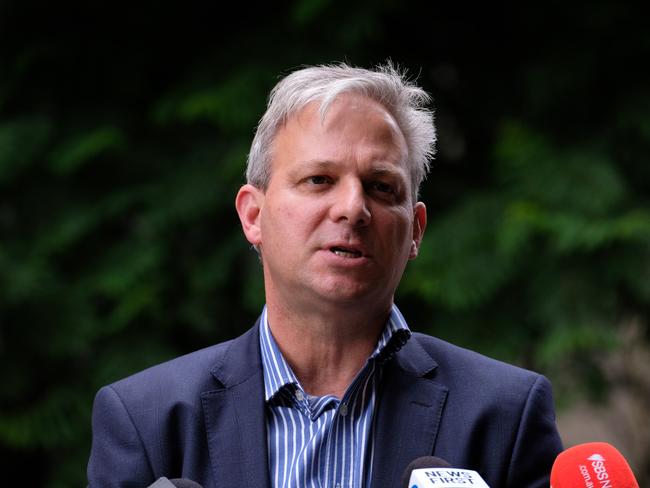
“There will be more results needed over the next few days,” Mr Foley said.
“The next 48 hours will be critical in making sure that we‘re in a position to get on top of this.
“Anyone who has been at those exposure sites, anyone in and around those suburbs – indeed, any Victorian anywhere who has even the slightest symptoms should come forward to the testing sites and get tested and isolate until you get those results.”
The state’s chief health officer Brett Sutton described it as still being “early days”, noting that some of the exposures only occurred as late as Wednesday.
“We do need to see that full 14 days of the incubation period play out before we can be absolutely happy that we’re in safe territory,” Professor Sutton said.
Professor Sutton said it was possible that authorities would never find out how the worker became infected.
PM EXPANDS OVERSEAS ARRIVALS
Prime Minister Scott Morrison said the number of international arrivals allowed into Australia would increase as of this month, as questions were raised about “human error” in hotel quarantine.
Caps for overseas flights will be expanded for NSW, Queensland, Victoria and South Australia from February 15, Mr Morrison said.
“We must remember that our borders are actually shut,” he said, following a national cabinet meeting.
“No-one can just come to Australia. To be able to come to Australia, you need to be an Australian resident or citizen, or have a particular exemption in a particular occupation or something of that nature, which is handled through Border Force, to enable someone to come.
And that is only a small proportion of the arrivals that come to Australia.”
Mr Morrison outlined changes to international arrivals per state. “It was … agreed that from 15 February, the caps will return to the previous levels for New South Wales and Queensland,” Mr Morrison said in Canberra. “So, we will see that capacity lift again.”
“South Australia is also increasing what they’ll take to 530. Victoria will increase to 1,310.”
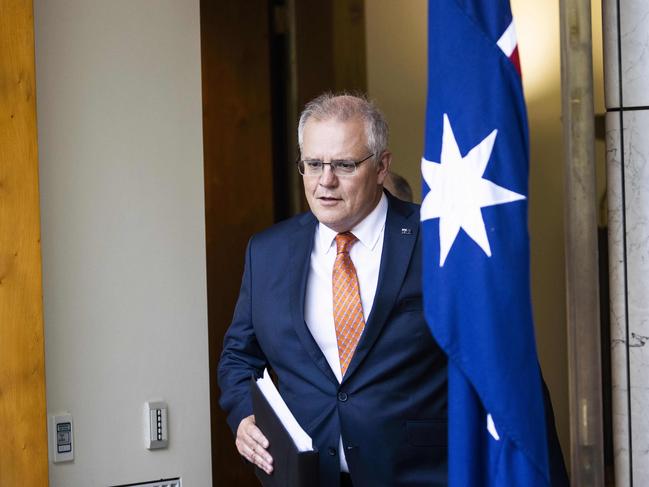
Mr Morrison said the quarantine facility at Howard Springs would likely be expanded. “Already expanding it to 850, and potentially well beyond that, which would involve a more than doubling of that capacity at Howard Springs,” he told reporters.
Mr Morrison also said the “risk” of COVID-19 was “shifting” due to the emergence of deadly mutant strains in the UK and South Africa.
Speaking after national cabinet, chief health officer Professor Paul Kelly addressed the threat of COVID transmission in hotel quarantine, saying “human error” was a concern.
“There is absolutely a need to continually improve the quality of our quarantine,” Professor Kelly said.
“We’ve seen only a small number of incursions from quarantine, and we need to understand these are complex systems with humans, and there is always an opportunity or a chance of human error.
“There is also chance issues like two doors opening across a corridor, as has seemed to have occurred in the Victorian situation.
“The system has worked very effectively up to now, and continues to work very effectively.”
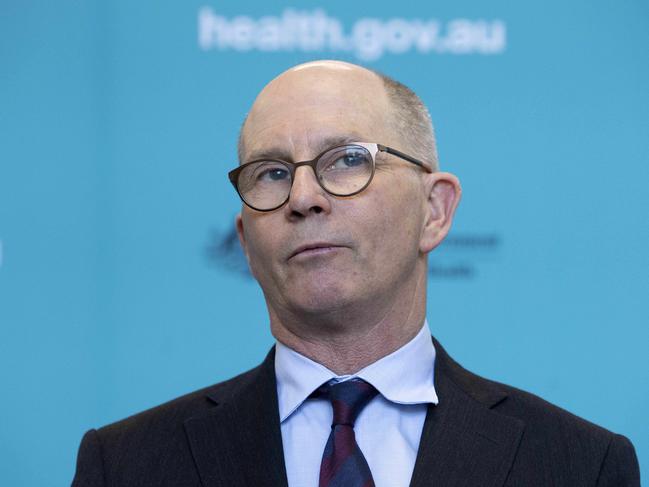
It came as the states clashed over who should take accountability for the coronavirus hotel quarantine program, with a string of hotel worker infections leading to snap lockdowns and tougher restrictions across the country.
According to a report in The Australian, Queensland Deputy Premier Steven Miles said it was “time for the federal government to contribute” to the quarantine program and claimed Mr Morrison had been “all care and no responsibility”.
Mr Morrison has defended the use of hotels to quarantine travellers and urged state leaders to have “a sense of realism … and a sense of proportion”.
He said hotels remained the most effective way to quarantine for travellers at the extent that Australia needed to provide.
“That remains the advice I have from my experts and the alternative is not that clear to me,” he said, according to The Australian.
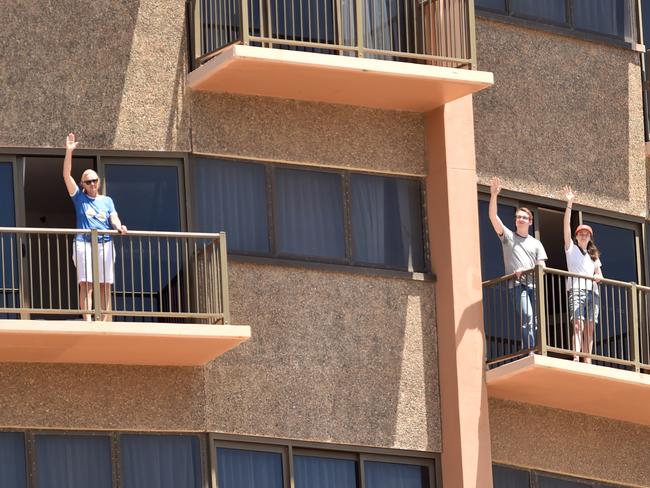
Mr Morrison pointed out that more than 211,000 people had travelled to Australia during the pandemic and that there had only been a small number of coronavirus cases transmitted into the community.
Meanwhile, Mr Morrison rejected a proposal from the Queensland government to quarantine travellers in Gladstone, but he was considering a different plan to house up to 6000 people at Wellcamp airport west of Toowoomba at a yet-to-be-built, purpose-designed facility.
Federal authorities are understood to have a long list of questions to be answered before making any commitments.
“The commonwealth is open where there are good proposals, very comprehensive proposals,” Mr Morrison said.
VACCINE VICTORY
Australia has secured another 10 million doses of the Pfizer-BioNtech COVID-19 vaccine, Prime Minister Scott Morrison said.
The boost in what is widely considered to be the world’s most effective coronavirus jab means Australia now has 150 million doses — 20 million of which are for the Pfizer vaccine — across three inoculation varieties.
Health Minister Greg Hunt said the order provided “additional support over and above that which was already in place.”
Secretary of the Department of Health, Professor Brendan Murphy, said Australia was in a strong position with three vaccines rolling out this year.

“That is a position that we wouldn’t have dreamt of a year ago, six months ago,” Prof Murphy said.
He said the Pfizer and AstraZeneca vaccines were set to be rolled out early this year pending approval from the Therapeutic Goods Administration, while the Novavax jab would be introduced “later on”.
“All of these three vaccines have now been shown to be highly effective at preventing clinical COVID disease, and particularly severe COVID disease,” Prof Murphy said.
Prof Murphy added there was some “early, encouraging information” from the UK that the AstraZeneca vaccine showed some evidence of preventing transmission of the coronavirus and not just stopping the development of the COVID-19 disease.
Australia has 53.8 million doses of the AstraZeneca jab on order which will be manufactured onshore.
Prof Murphy said the Pfizer vaccine would be distributed via “dedicated state and territory-run Pfizer hubs”.
He said it would be offered to: “border workers, quarantine workers, very exposed frontline healthcare workers, such as ICU, emergency department, and most importantly, the most vulnerable people – people in residential aged care, residential disability care, and those workers.”
He said Australians would not have a choice in which vaccine they receive, but added both jabs were “extremely good”.
NSW
There are no restrictions around travelling to or from regional or rural NSW, or other areas of NSW.
However, NSW Health currently recommends practising COVID safe behaviours such as physical distancing and hand hygiene when travelling within NSW, especially between Greater Sydney and regional and rural areas.
All arrivals from Western Australia will be required complete an interstate traveller declaration confirming whether they attended any venues of concern. If so, they will be required to isolate for 14 days.
Travellers who have been in the WA’s Peel region, Perth and the South West region since January 25 will be required to get tested within 48 hours of arriving in NSW.
They will also have to follow the same lockdown rules as WA residents, including staying home for five days – until 5pm Friday.
“If they do not get tested, they are required to remain at home for a total of 14 days,” the department said.
SOUTH AUSTRALIA
Sydneysiders are allowed to travel into South Australia.
But visitors will need to be tested on day one, five and 12 of their stay and must isolate until they receive a negative result from their first swab.
Travellers from outside of the Greater Sydney area will have no restrictions and do not need to be tested.
Travellers from Victoria, Queensland, Tasmania, Tasmania, the Northern Territory and the ACT can enter without restriction but must complete a Cross Border Travel Registration.
SA’s hard border closure with WA will be dropped immediately.
Anyone who is in quarantine after arriving in South Australia from Western Australia can end their quarantine immediately, unless they were at the Four Points Hotel.
It means more than 1300 people can leave quarantine immediately.
Travellers from Perth hot spots will still be required to get a test on days one, five and 12 and isolate until they get their first negative test result.
VICTORIA
People from anywhere in Australia entering Victoria must apply for a permit to enter the state.
Victoria has also reopened its border to the majority of NSW.
However, those from the Cumberland LGA will need to apply for an “orange zone” permit, meaning travellers from the area will need to take a COVID-19 test within 72 hours after arriving in Victoria and isolate both before and after the test.
Victoria has also slammed its border shut to the majority of Western Australia.
Anyone who tries to cross the border from a ‘red zone’ will face a $5000 fine.
Travellers who have visited Perth metropolitan area, the Peel region and the South West region of Western Australia since January 25 will not be allowed to enter Victoria.
Those caught flouting the ban will be taken straight to hotel quarantine.
NORTHERN TERRITORY
The Northern Territory have declared 10 Melbourne suburbs as hot spots. The suburbs include: Melbourne, West Melbourne, Noble Park, Keysborough, Springvale, Brighton, Brandon Park, Clayton South, Heatherton and Moorabbin.
All arrivals to the Northern Territory (NT) must fill in a Border Entry Form and complete 14 days of mandatory supervised quarantine at their own expense, if they have recently been in an active declared COVID-19 hot spot. This includes children returning from a hotspot.
Perth and surrounds have been declared a COVID-19 hotspot by health officials in the Top End.
All travellers entering the Northern Territory from 7.30pm Sunday, January, 31 are required to go into mandatory quarantine in either Alice Springs or Darwin at a cost of $2500 per person.
QUEENSLAND
From Monday, February 1, anyone who has been in any part of New South Wales will be able to enter Queensland, by any means of travel, without having to quarantine or having to complete a border pass
People from most other parts of Australia can travel to Queensland freely.
However, anyone who has been in Western Australia’s LGAs of concern and arrive in Queensland after 6pm on Sunday, January 31, will be forced into 14 days of hotel quarantine.
Queensland Health said anyone who is already in Queensland and has been to Perth, the Peel or South West regions since January 25 should come forward for testing and isolate until they receive a negative result.
WESTERN AUSTRALIA
Interstate travellers are now permitted to enter WA, subject to meeting strict conditions. More information is available at COVID-19 coronavirus: Controlled interstate border.
International arrivals
The Commonwealth Government is responsible for Australia’s international border.
If you are seeking to enter Western Australia from outside Australia, you may require approval to enter Australia from the Commonwealth Government. It is highly recommended that you visit the Department of Home Affairs website and read the information on the travel restrictions in place to determine if you need approval from the Commonwealth, in addition to a G2G PASS, to enter Australia.
All people arriving into WA from overseas are subject to the Commonwealth Government’s mandatory quarantine period of 14 days in a State Quarantine Facility (hotel quarantine) at their own expense.
Travellers entering WA from New Zealand via another state
Interstate arrivals who have spent time in New Zealand in the previous 14 days will be required to self-quarantine for 14-days at a suitable premises and present for a COVID-19 test on Day 11 of their time in WA.
Travellers arriving in WA directly from New Zealand will be considered international travellers and are subject to the Commonwealth Government’s mandatory quarantine period of 14 days in a State Quarantine Facility (hotel quarantine) at their own expense.
TASMANIA
Tasmania has fully reopened its border with NSW.
The state has deemed Perth and the Peel and South West regions of WA as high-risk and travel is not permitted. Anyone seeking an exemption must use the state’s G2G Pass system. All other areas of Australia are low risk, with no quarantine requirements, but travellers must register with Tas e-Travel.
Those from other areas of Australia can travel to Tasmania without restriction.
AUSTRALIAN CAPITAL TERRITORY
ACT Health has urged anyone who has been in the parts of Western Australia currently in lockdown since January 25, to quarantine.
Deputy chief health officer Vanessa Johnston said the quarantine period would be the same as the five-days enforced in WA.
However, people from WA as well as other parts of Australia can still travel to the ACT.




